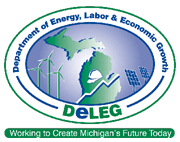 To help minimize costly disputes at the local community level, in 2011, the Bureau of Energy Systems began to work with the Community Dispute Resolution Program in Michigan to provide communities with contact information for individuals with specific expertise in wind related Community Dispute Resolution, as well as information on the Community Dispute Resolution Program (CDRP) program. In many jurisdictions throughout Michigan, courts are making citizens aware of the availability of mediation as an alternative to litigating many types of disputes.
To help minimize costly disputes at the local community level, in 2011, the Bureau of Energy Systems began to work with the Community Dispute Resolution Program in Michigan to provide communities with contact information for individuals with specific expertise in wind related Community Dispute Resolution, as well as information on the Community Dispute Resolution Program (CDRP) program. In many jurisdictions throughout Michigan, courts are making citizens aware of the availability of mediation as an alternative to litigating many types of disputes.
Community Dispute Resolution is a voluntary process in whichtwo or more parties meet with a trained neutral mediator and together find a resolution to their problem. Mediators have no decision making authority, and they do not render case evaluations as in the MCR 2.403 case evaluation process. Instead, mediators are trained to assist the parties in generating options that result in a mutually acceptable resolution of their conflict.
The Alternative Dispute Resolution (ADR) Section of the Michigan State Bar houses a number of mediators who have mediated gas/oil, land use and various additional “siting” type issues, including wind farm issues. Other trained individuals work in government, private industry, the non-profit sector and academia. Some individuals have trained specifically related to Wind Energy. Michigan also has a network of Community Dispute Resolution Program (CDRP) centers that offer mediation. The centers supported in part with funding from the Michigan Supreme Court, are available to provide mediation in a wide variety of dispute types. (See: http://courts.michigan.gov/scao/dispute/ for information on Community Dispute Resolution program).
Local Community Wind Projects and Community Dispute Resolution
Many local municipalities are incorporating a provision for wind specific dispute resolution processes in their Community Engagement, Planning Process and Local Zoning Ordinances associated with the planning, implementation and operation stages of local wind farms. In the interest of minimizing the number of pre and post construction complaints and disputes, the local municipalities may also wish to consider some community engagement process and/or preventive measures that might reduce the need for formal dispute resolution processes or litigation. For example, provisions might address requiring wind companies to include good neighbor payments to non-participants who are located within a predetermined distance of a utility scale wind turbine. Another consideration for municipalities that wish to minimize disputes may be to limit wind energy projects only to areas of low residential density. Overlay encouraging continued use of those areas for agricultural purposes. In more industrialized areas, wind energy overlay districts could be identified to encourage placement of wind turbines in areas zoned as industrial.
Finally, within the context of community engagement, local municipalities may wish to explore ways to enhance opportunities for local business development associated with wind energy. For example, community economic development specialists may wish to explore ways to help existing manufacturers become suppliers (i.e., raw material, component, sub-system, total-system suppliers) to Original Equipment Wind Manufacturers (especially those that supplied the local Turbines). Communities may also wish to explore ways to enhance and integrate local Science, Technology, Engineering and Math (STEM) curriculum’s with the wind energy projects. Related to this, local community organizations may wish to explore ways to provide college scholarships to local students that pursue wind related careers.
Finally, in the context of Economic Gardening, local communities may wish to also explore business incentives for local sstudents who major in entrepreneurship at a Michigan university/college and return to their home communities to launch new wind related ventures.
Individuals with Expertise in Wind Related Community Dispute Resolution
Additional information about the Community Dispute Resolution Program (CEDP) program, including a list of mediation centers across the state, can be found at: http://courts.michigan.gov/scao/resources/other/cdrcenters.pdf. Individuals can also discuss any potential additional alternative dispute resolution options with staff of the Office of Dispute Resolution, Michigan Supreme Court (Contact: Doug Van Epps, Director, 517-373-4840, vaneppsd@courts.mi.gov). Finally, the Bureau of Energy Services has identified the following individuals as having specific expertise in wind related community dispute resolution and wind energy:
- David Bidwell 336-416-1644, bidwell2@msu.edu
- John Sarver, 517-290-8602, johnsarver3@gmail.com
- Dan Cherrin, 313-300-0932, dcherrin@fraserlaw.com
- Richard J. Figura, 231-326-2072
For more information about BES Community Dispute Resolution Program (VDRP) for Wind Energy please contact Mark H. Clevey, office: 517-241-6280, office email: cleveym@michigan.gov



